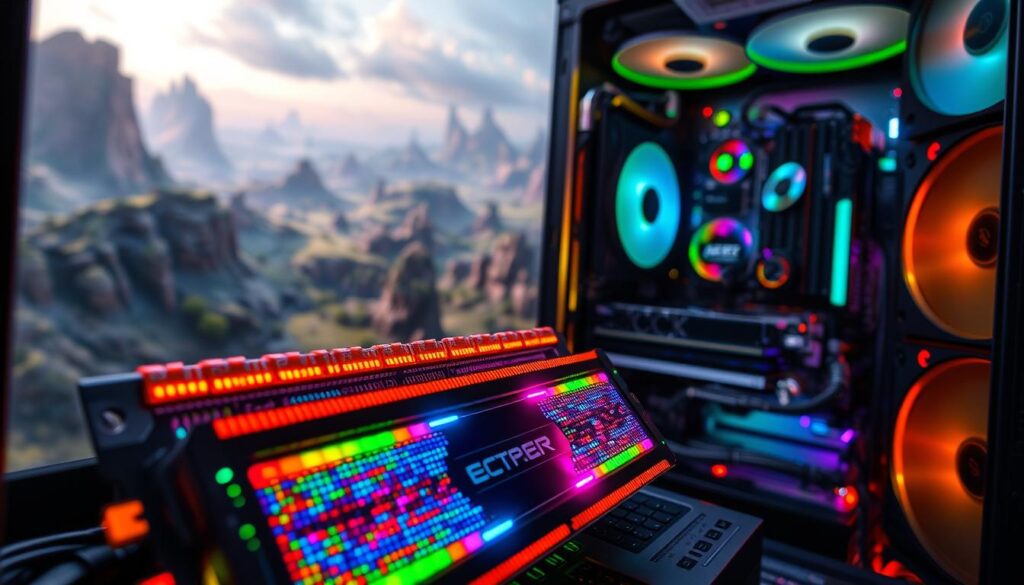Ever wondered how survival games create huge, detailed worlds without slowing down? The secret is RAM optimization for procedural maps. In today’s gaming world, fast and smooth play is key. This means we need to know how to manage memory well.
Games like Zombie Survival: Battle Royale and LifeAfter show us how it’s done. They keep the game running smoothly, even with lots of action. This is thanks to smart RAM use.
Introduction to Real-Time Generated Procedural Maps
Real-time generated procedural maps are a big leap in gaming. They use complex algorithms to make different landscapes instantly. This means players see new terrains every time they play.
This approach makes games more fun because they’re always changing. Players face new challenges and discover new places. It’s a way to keep the game exciting and fresh.
These maps are special because they’re different every time. They offer a unique challenge that fits how each player likes to play. This makes the game more interesting and keeps players coming back for more.

The Role of RAM Optimization in Gaming
RAM optimization is key to better gaming. It helps keep games running smoothly, even when things get intense. Without it, games might lag, stutter, or crash, ruining the fun.
Using smart RAM optimization makes games run better. This is especially true in fast-paced games where every second matters. With optimized RAM, games look sharper and respond faster, making the game more enjoyable.
Game developers use different ways to manage memory well. Good memory management can make a game a hit or a miss. By focusing on RAM optimization, players can dive into games without tech troubles getting in the way.

Understanding Procedural Generation Techniques
Procedural generation is key in modern game design. It lets developers make games that are both big and detailed without working too hard. By using algorithms, they can create everything from landscapes to characters and stories automatically.
This method makes game design easier and allows for environments that change based on what the player does. It’s a big help for designers and makes games more exciting.
The algorithms behind procedural generation make sure each game is unique. For example, they can shape terrain to look like real landscapes. This means players can have different experiences every time they play.
Also, procedural generation helps smaller teams make games that feel as big as those from bigger companies. It’s a key part of game design today. It helps mix exciting stories with vast, changing worlds.
Key Benefits of Real-Time Procedural Maps in Survival Games
Real-time procedural maps add a lot to survival games. They make each game session different. Players face new terrains, loot spots, and enemies every time.
This keeps the game exciting and fresh. It makes players always ready to change their plans. This leads to a game that’s always changing and fun.
These maps also make exploring more fun. Players can go through forests, mountains, and deserts. Each place needs its own survival skills.
This variety keeps players coming back. They want to see what new stories and challenges they can find. It makes the game more replayable.
Moreover, these maps make players think strategically. They have to choose how to use their resources. This adds depth to the game and makes it more immersive.
| Benefit | Description |
|---|---|
| Increased Variety | Unique terrains and encounters enhance each gameplay session. |
| Player Engagement | Diverse environments and strategies keep players involved. |
| Dynamic Gameplay | Constantly changing scenarios challenge players to adapt. |
| Replayability | Different experiences and stories with each playthrough motivate repeated gameplay. |
Importance of Memory Allocation for Performance
Proper memory allocation is key for good gaming performance. This is especially true for survival games with big maps. How memory is used affects how well resources are managed and the game’s speed.
Good memory management means the game runs smoothly. Players can explore big areas without any problems. This makes the game more enjoyable.
Designers need to focus on efficient memory use. This helps cut down on loading times and reduces lag. Both are bad for the player’s experience.
By smartly managing memory, developers can make detailed worlds. Yet, they keep the game fast and responsive. This is what players want.
RAM Optimization in Real-Time Generated Procedural Maps
RAM optimization is key for better performance in real-time procedural maps in games. Developers use various techniques to make games run smoothly, even with big, changing environments. They focus on smart memory use to improve gameplay and make it more fun.
Techniques for Effective RAM Allocation
Object pooling and memory profiling are top RAM optimization methods. Object pooling lets game objects be reused, cutting down on memory use. Memory profiling tools help find where memory is being used and how to use it better. These steps help avoid memory leaks and keep games stable during long play sessions.
Impact on Gameplay Experience
Good RAM use doesn’t just make graphics better; it also cuts down on delays. This makes the game more fun to play. With smart memory use, players see better transitions and quicker loading times. This makes the game world feel more real and enjoyable.
Challenges Faced with High Memory Usage
High memory usage in gaming can cause many problems. Players often see lag or system crashes. These happen a lot during intense gaming, when memory needs go up.
Games that don’t free up unused memory can slow down. Players might see slower frame rates and longer loading times. This makes gaming less fun. It’s key to keep an eye on memory leaks to keep games running smoothly.
Dealing with these issues shows how important it is to optimize games. Developers need to focus on managing memory well. This helps keep players happy and makes games more competitive.
Strategies for Preventing Memory Leaks
Memory leaks can really slow down games, especially as they get more complex. It’s key for developers to use good prevention strategies to keep games running well. One way is to regularly check how much memory the game uses. This helps find leaks early, before they cause problems.
Writing code that uses memory wisely is also important. Developers should make sure objects are deleted when they’re not needed anymore. This not only helps find and fix leaks but also makes the game run better.
Using tools to manage memory can also help a lot. These tools can show where memory is being used, making it easier to spot issues. With this info, developers can fix their code, making the game smoother for players.
Tools to Monitor and Optimize RAM Usage
Developers work hard to make games run smoothly. They use memory monitoring tools to find ways to use RAM better. Tools like Unity Profiler and Unreal Engine’s Memory Profiler help them see where memory is being used.
Unity Profiler shows how much RAM is being used in real time. It helps developers see how different parts of the game use memory. This makes it easier to make the game run better.
Unreal Engine’s Memory Profiler gives a detailed look at how memory is used. It helps developers find and fix problems that slow down the game.
| Tool | Key Features | Benefits |
|---|---|---|
| Unity Profiler | Real-time performance data, asset memory usage tracking | Identifies memory inefficiencies, enhances overall gameplay |
| Unreal Engine’s Memory Profiler | Detailed memory analysis, visual reporting | Pinpoints memory leaks, enables targeted optimization efforts |
| Valgrind | Memory leak detection, profiling | Prevents unnecessary memory consumption, ensures stability |
Using these tools helps developers understand how RAM is used. This leads to better game performance. Regular checks help keep the game running smoothly, making it more fun for players.
Popular Applications for Memory Management
Effective memory management is key for better gaming. It makes sure games run smoothly. Many apps help users manage RAM to improve game performance.
Real-World Examples of Successful RAM Optimization
Many game tools have shown how well they work. Here are some examples:
| Application | Type | Key Features | Impact on Game Performance |
|---|---|---|---|
| Game Booster | Memory Manager | Prioritizes game processes, closes background apps | Increases frame rates and reduces lag |
| Razer Cortex | Optimization Suite | Game launcher, FPS boost, system optimization | Enhances overall performance and loading times |
| CCleaner | System Cleaner | Removes unnecessary files, cleans RAM | Frees up memory, improves stability |
These apps show how good optimization can make games better. They help players manage their system. This lets them enjoy games more.
Future Developments in Memory Management for Games
The future of memory management in gaming is exciting. It’s all about new technologies like AI and machine learning. These tools could change how we manage memory in games.
They can analyze data in real-time and predict what’s needed. This means memory can be used more efficiently. Games could run smoother than ever before.
As games get better, developers will find new ways to use memory. They want to keep games detailed and complex. This will make games more immersive and visually stunning.
Cloud computing and decentralized gaming will also play a big role. By using the cloud, games can run on less powerful hardware. This is good news for all kinds of games, big and small.
Conclusion
Memory management is crucial, especially in survival games with real-time maps. RAM optimization helps manage these complex environments. It makes games more engaging and immersive for players.
We looked at how RAM optimization reduces lag and improves gameplay. By combining procedural generation with smart memory use, games can offer detailed worlds without slowing down systems.
The gaming world is always changing, and RAM optimization is key to this evolution. It’s not just about tech; it’s about making games better for players. As developers use these tips, the future of survival games looks bright, with more to discover.
FAQ
What are real-time generated procedural maps?
Real-time generated procedural maps create dynamic environments. They change during gameplay. This makes survival games like Zombie Survival: Battle Royale and LifeAfter more fun and immersive.
How does RAM optimization improve gaming performance?
RAM optimization makes games run smoother. It stops lag, stuttering, and crashes. This means better graphics and gameplay in fast-paced survival games.
What techniques are used for effective RAM allocation?
Object pooling and memory profiling are key. They help manage resources and game performance. This prevents memory leaks and keeps the game stable, improving the player’s experience.
What challenges are associated with high memory usage in games?
High memory usage can cause lag and crashes. This hurts the player’s experience. It’s important to fix these issues for a better gaming environment.
How can developers prevent memory leaks?
Developers can stop memory leaks by profiling regularly. They use efficient coding and memory tools. This keeps gameplay smooth over time.
What tools are available for monitoring RAM usage?
Unity Profiler and Unreal Engine’s Memory Profiler help track RAM. They find inefficiencies. This leads to better game performance and experiences.
Can you provide examples of applications that effectively manage memory?
Game Booster, Razer Cortex, and CCleaner boost game performance. They manage RAM well. This gives players smoother gameplay.
How might future technologies impact memory management in gaming?
AI and machine learning will change memory management. They’ll optimize resources on the fly. This will let for more complex games without losing performance. It will make future gaming better.




